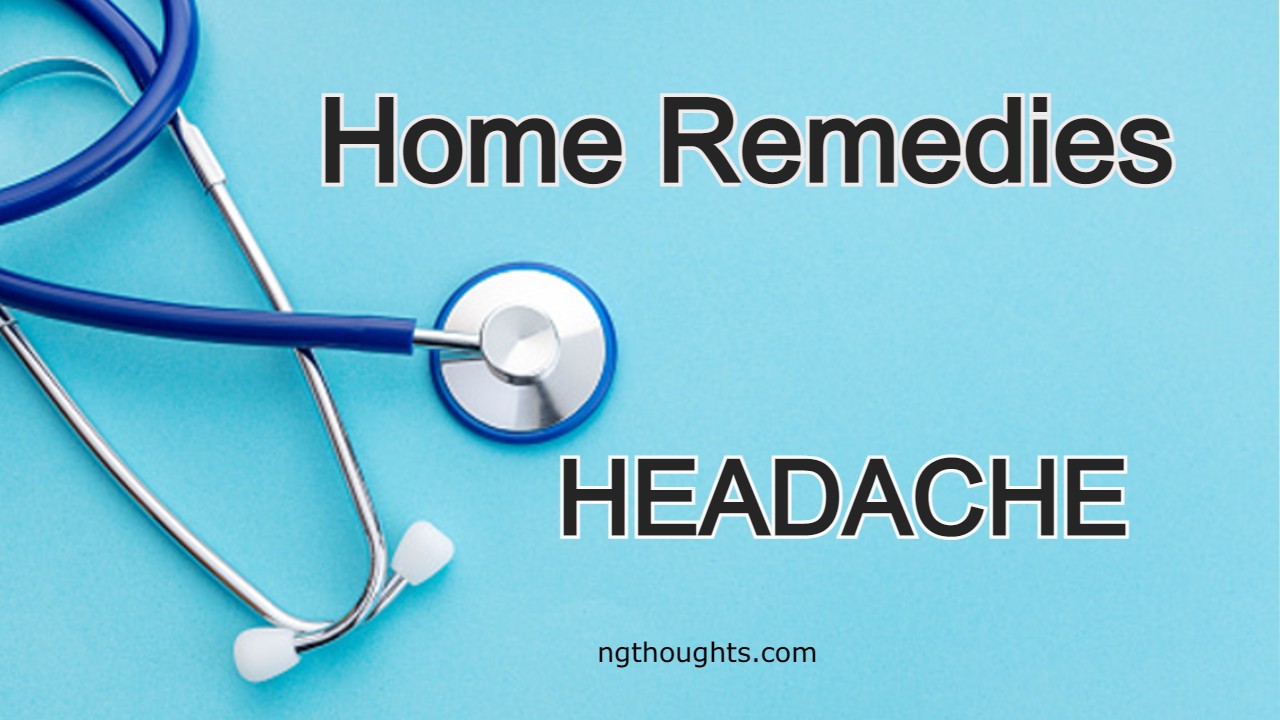Home Remedies For Headache
A headache is a term used to define any kind of ache or pain that occurs in and around the head, or even in the upper neck. Headaches may occur independently, in the sense that they are unconnected to any health condition or disease, or they may at times occur as a symptom of some disease. All of us experience headaches at some point or other and it is in fact one of the most common complaints and also the most widely treated with home remedies and pharmaceutical headache treatments. Although headaches may in most cases be unconnected to specific ailments or health conditions they are often like a warning system from our body that something is not right. In most cases, it is stress, lack of sleep, and other such circumstances that trigger this response. For example, if you haven’t had adequate sleep for a few nights in a row you would most likely experience headaches. Headaches may not necessarily be triggered by psychological factors such as emotional distress, stress, and so on, but could also be triggered by physical stress and exhaustion.
Virtually everyone gets a headache at one time or another. An estimated 17.6 percent of women and 6 percent of men in the United States experience headaches on more than an occasional basis, and some 20 million regularly experience cluster and migraine headaches. Home remedies are the best way to treat a headache because they are as common—and as difficult to cure—as the common cold and flu. Common causes of headache include stress; tension; anxiety; allergies; constipation; coffee consumption; eyestrain; hunger; sinus pressure; muscle tension; hormonal imbalances; temporomandibular joint (TMJ) syndrome; trauma to the head; nutritional deficiencies; the use of alcohol, drugs, or tobacco; fever; and exposure to irritants such as pollution, perfume, or after-shave lotions. Migraines result from a disturbance in the blood circulation in the head.
Headache experts estimate that about 90 percent of all headaches are tension headaches and 6 percent are migraines. Tension headaches, as the name implies, are caused by muscular tension. Another type of headache is a cluster headache. These are severe, recurring headaches that strike about 1 million Americans, and are widely considered to be the most painful type of headache. Using home remedies for headaches is a great way to get rid of the pain without using drugs. Headaches can also be a sign of an underlying health problem. People who suffer from frequent headaches may be reacting to certain foods and food additives, such as wheat, chocolate, monosodium glutamate (MSG), sulfites (used in restaurants on salad bars), sugar, hot dogs, luncheon meats, dairy products, nuts, citric acid, fermented foods (cheeses, sour cream, yogurt), alcohol, vinegar, and/or marinated foods. Other possibilities to consider are anemia, bowel problems, brain disorders such as tumors, bruxism (tooth-grinding), hypertension (high blood pressure), hypoglycemia (low blood sugar), sinusitis, spinal misalignment, toxic overdoses of vitamin A, and vitamin B deficiency, and diseases of the eye, nose, and throat. Dehydration also can cause headaches—often accompanied by a feeling of being flushed, a warm face, and a sense of heaviness in the head.
Unless otherwise specified, the dosages recommended here are for adults. For a child between the ages of twelve and seventeen, reduce the dose to three-quarters of the recommended amount. For a child between six and twelve, use one-half the recommended dose, and for a child under the age of six, use one-quarter of the recommended amount.
The common causes and triggers of day-to-day headaches include:
- Emotional stress
- Depression
- Anger
- Anxiety
- The constriction of blood vessels or the tightening of facial and scalp muscles when feeling negative emotions can all result in decreased blood and oxygen flow to the brain, which can lead to a headache.
- Illnesses: Sinus infections, eyestrain, vision problems, allergies, dental infections, grinding and clenching of teeth, viral infections, urinary tract infections, and head injuries can all cause headaches.
- Insomnia: The lack of sleep or sleep disorders can cause muscle tension, which can lead to headaches.
- Food sensitivities: Chocolate, caffeine, dairy products, and food additives like nitrates, nitrites, and monosodium glutamate are well-known headache triggers
- Skipping meals: Irregular meals and fad diets can lower blood sugar levels and give you a headache. Dehydration is also a common cause of headaches.
- Alcohol & drugs: The consumption of alcohol, prescribed medication, cocaine, amphetamines, and diet pills can lead to headaches.
- Rebound headaches: Regular use of some painkillers may result in a rebound headache once the painkiller begins to wear off. Headaches may also occur during withdrawal from addictive substances such as drugs, caffeine, and prescription medication.
- Other factors: Glare, poor lighting conditions, physical exertion, and chemical sensitivities also cause headaches.
Head Ache Symptoms
- Pain in the head
- Blurred vision
- Nausea and vomiting
- Hearing impairment
- Irritability
- Confusion
- Malaise
- Discomfort
Tips for Head Ache
- Eat a healthy diet filled with fruit and vegetables, and do not skip meals for too long.
- Drink plenty of water to keep the body hydrated.
- Exercise regularly to improve your circulation
- Use relaxation techniques such as deep breathing exercises, hands-on-healing, and therapeutic touch to reduce the intensity of a headache.
- Keep a headache journal to document each headache – how long it lasts and when it happened and what triggered it, to discuss with your health care professional.
- Apply an ice pack to your forehead and temples or a heat pack to the back of your neck to loosen tense muscles.
- Soak in a hot tub; the hot water helps to relax the contracted muscles that cause the headache.
- Spend time outside in the fresh air or go for a walk on the beach.
- Limit alcohol consumption and increase water intake.
- Limit hours spent in front of a computer screen.
- Avoid watching television for too long or in a dimly-lit room.
- Try to get a good night’s rest.
Home Remedies For Headache
- Coenzyme Q10 plus Coenzyme A Improves tissue oxygenation. Take 30 mg twice daily.
- Calcium and magnesium are Minerals that help to alleviate muscular tension. Use chelated forms. Deficiency may be a cause of migraines. Relaxes muscles and blood vessels. Take 1,000 mg daily.
- sulfate is a natural alternative to aspirin and other nonsteroidal anti-inflammatory drugs (NSAIDs).
- Cayenne thins the blood, which reduces pain and allows beneficial blood flow.
- Chamomile relaxes muscles and soothes tension.
- Ginkgo biloba extract improves circulation to the brain and may be helpful for certain types of headaches.
- Guarana can alleviate cluster headaches. Taking Steam containing Eucalyptus oil drops or decongestant vaporizing ointments like Vicks vaporub, Sensor or only steam helps to get rid of headaches due to cold congestion or sinus problems.
- Applying Eucalyptus oil on the forehead also helps to relieve headaches due to colds.
- Equal quantities of Cumin seeds (Jeera), Black pepper (Kali mirch), Coriander seeds (Dhania), and Dry ginger powder. A spoon of this powder boiled in water with Jaggery (Gur) and taken before sleep helps to get relief from headaches due to colds.
- Eating an Apple every day with salt helps to overcome headaches.
- Cinnamon (Dalchini) ground with Lemon juice applied on the forehead helps to get relief from headaches.
- Dry Coconut chewed with Sugar candy (Mishri) helps to get relief from headaches.
- Applying Castor oil (Erand ka teil) Gingery oil (Til oil) or Coconut oil (Nariyal) on the center of the head helps to get relief from headaches.
- Tamarind (Imli) mixed in water with Jaggery (Gur), filtered, and taken twice a day helps to overcome headache which comes because of heat.
- Use a homeopathic remedy suitable for the particular headache symptoms you are experiencing. Belladonna helps with sudden, severe pain that is worse on the right side, of the body. Natrum muriaticum is recommended for tension headaches and periodic headaches. Sanguinaria is good for pain that is sharp and splitting. Arsenicum album, kali-bichrornium, Mercurius solubilis, and Pulsatilla all encourage drainage of the sinuses.
Author: Dr Izharul Hasan
READ MORE:



I’m really inspired with your writing talents and also with the layout for your weblog. Is this a paid topic or did you customize it your self? Either way keep up the excellent quality writing, it is rare to see a nice blog like this one nowadays!